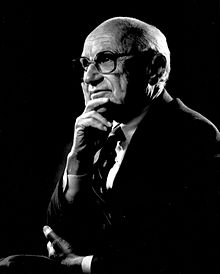Friedman, Milton

Bio: (1912-2006) American economist. Milton Friedman got his Ph.D. from the University of Columbia and taught at the universities of Chicago and Stanford. He was awarded the Nobel Memorial Prize in economics in 1976. Friedman was one of the most notable members and proponents of the Chicago School of Economics. This approach emphasized the importance of free markets, limited government intervention, and rigorous empirical analysis. Friedman’s ideas have left an indelible mark on policy, academia, and public discourse. Friedman's contributions span a wide range of topics, including monetary theory, economic freedom, and the role of government in the economy.
Friedman's early work focused on macroeconomics and monetary theory, laying the foundation for some of his most influential ideas. In the book Income from Independent Professional Practice (1945), Friedman introduced the concepts of transitory and permanent income. He developed those concepts in Theory of Consumption Function (1957). This book tried to refute the basics of Keynesian economics, as Keynes argued that the average tendency to consume will decline with rising income. Contrary to that, Friedman proposed the hypothesis that permanent aggregate consumption depends on permanent income, that is expected long-term income. Friedman also rejected other key Keynes’ ideas - secular stagnation thesis and unemployment equilibrium.
One of Friedman's seminal contributions was his advocacy for monetarism. He believed that the money supply's control was paramount in stabilizing the economy and controlling inflation. His “Quantity Theory of Money” argued that changes in the money supply would eventually lead to corresponding changes in prices. Money supply depends on the velocity of circulation of money, which is itself determined by changes in real income. He applied this “monetarist” approach to the business cycle and argued that the Great Depression (1929–1933) was caused by inadequate policy responses by the Federal Reserve Bank when faced with the contraction in money supply. This was the real cause of stock market and bank failures and eventually led to depression. This theory had profound implications for central bank policy, promoting a systematic and predictable approach to managing the money supply. Though the practical implementation of monetarist policies faced challenges, it shaped the discourse around monetary policy for decades.
Friedman's advocacy for economic freedom was another cornerstone of his philosophy. He contended that free markets were essential for fostering innovation, efficiency, and individual liberty. In his influential work Capitalism and Freedom (1962b), he argued against government interventions that he believed hindered market mechanisms. He believed that competitive markets, coupled with minimal government interference, could lead to optimal outcomes for society as a whole.
The concept of the "natural rate of unemployment" was another concept that garnered significant attention. Friedman argued that attempting to reduce unemployment below its natural rate through monetary policy would only result in temporary gains and inflation in the long run. This idea challenged the prevailing notion that governments could sustainably achieve full employment without consequences.
Friedman's perspectives extended beyond theoretical frameworks; he was an advocate for school choice and the elimination of the military draft.
Fields of research
Capitalism Corporations Crisis Democracy Economy Entrepreneurship Market Privatization Socialism State UnemploymentTheoretical approaches
Chicago School of EconomicsMain works
Income from Independent Professional Practice (1945);
Essays in Positive Economics (1953);
Studies in the Quantity Theory of Money (1956);
A Theory of the Consumption Function (1957);
A Program for Monetary Stability (1959);
Capitalism and Freedom (1962a);
“Should There Be an Independent Monetary Authority”, in In Search of A Monetary Constitution, ed. Leland B.Yeager (1962b);
A Monetary History of the United States (1963);
The Balance of Payments: Free Versus Flexible Exchange Rates (1967);
“The Role of Monetary Policy”, in American Economic Review (1968);
There’s No Such Thing as a Free Lunch (1975);
“Nobel Lecture: Inflation and Unemployment”, in Journal of Political Economy (1977);
Free to Choose (1980);
Tyranny of the Status (1984);
Money Mischief: Episodes in Monetary History (1992).

